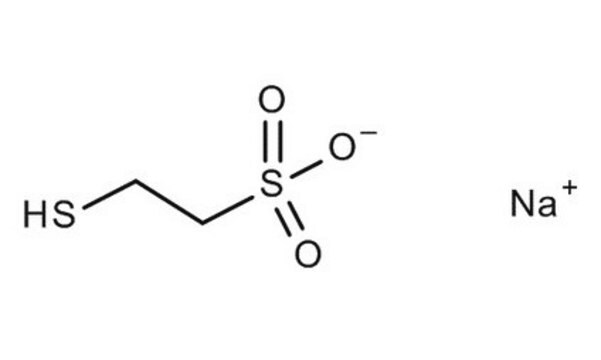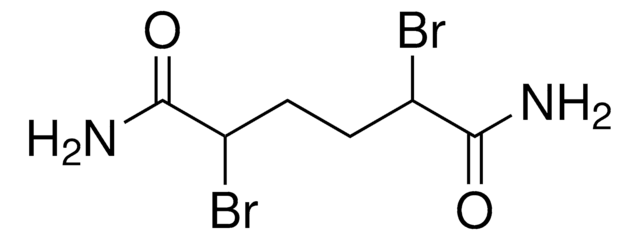M1511
Sodium 2-mercaptoethanesulfonate
analytical standard, ≥98.0% (titration)
Synonym(s):
2-Mercaptoethanesulfonic acid sodium salt, Coenzyme M sodium salt, HS-CoM Na, MESNA
About This Item
Recommended Products
grade
analytical standard
Quality Level
Assay
≥98.0% (titration)
technique(s)
HPLC: suitable
gas chromatography (GC): suitable
application(s)
clinical testing
format
neat
SMILES string
[Na+].[O-]S(=O)(=O)CCS
InChI
1S/C2H6O3S2.Na/c3-7(4,5)2-1-6;/h6H,1-2H2,(H,3,4,5);/q;+1/p-1
InChI key
XOGTZOOQQBDUSI-UHFFFAOYSA-M
Looking for similar products? Visit Product Comparison Guide
General description
Application
- Quantification of sodium 2-mercaptoethanesulfonate (MESNA) from human samples by micellar electrokinetic chromatography (MEKC) coupled with UV detection and in-capillary derivatization of MESNA
- Development of a fluorescence-enhanced histidine stabilized gold nanoclusters (His-Au NCs) based probe for the detection of sodium 2-mercaptoethanesulfonate in uromitexan samples
- High-performance liquid chromatography-tandem mass spectrometric based bioanalysis of sodium 2-mercaptoethanesulfonate in rat plasma samples
- To quantify sodium 2-mercaptoethanesulfonate in two of its pharmaceutical preparations (injections) by surface-enhanced Raman scattering (SERS) using gold colloid as a probe
Other Notes
Signal Word
Warning
Hazard Statements
Precautionary Statements
Hazard Classifications
Eye Irrit. 2 - Skin Irrit. 2 - STOT SE 3
Target Organs
Respiratory system
Storage Class Code
11 - Combustible Solids
WGK
WGK 2
Flash Point(F)
Not applicable
Flash Point(C)
Not applicable
Personal Protective Equipment
Choose from one of the most recent versions:
Already Own This Product?
Find documentation for the products that you have recently purchased in the Document Library.
Customers Also Viewed
Our team of scientists has experience in all areas of research including Life Science, Material Science, Chemical Synthesis, Chromatography, Analytical and many others.
Contact Technical Service














